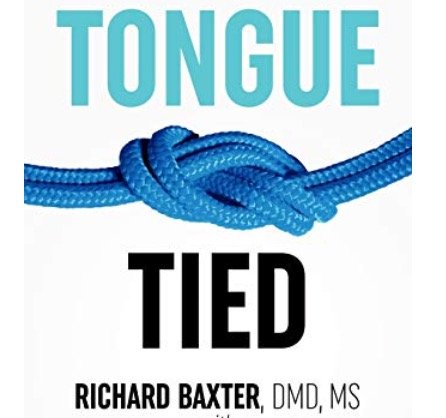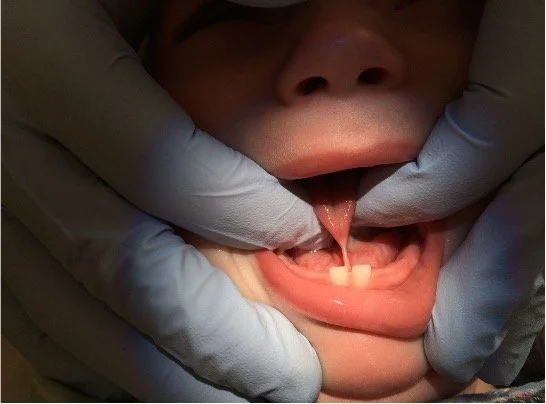
Blog
Useful and free info on dental implants, cosmetic dentistry, family dentistry, and more. All posts written by our doctors, not AI or some outside marketing firm. If you are in Campton Hills, St Charles, Geneva, Batavia, Elburn, Elgin, or anywhere in Kane County, these posts will be helpful!
Tongue and Lip Ties Part 2: Gathering Information and Consultations
We read books, researched online, listened to podcasts, and had consultations with 5 professional healthcare providers before making our decision about our son’s lip and tongue tie. Here’s what we learned!
As parents our emotional journey leading up to my son's release procedure was a rollercoaster of anxiety, uncertainty, and determination. We were somewhat anxious through the entire process but our unwavering commitment to our son's well-being ultimately led to the decision to proceed with getting his ties released. Along the way, we researched on our own and consulted with various healthcare professionals to ensure we would make the best choice for our child. Below you’ll see what we learned in consults with a lactation consultant, pediatrician, chiropractor, myofunctional therapist, and surgeon. Then I’ll describe the procedure itself!
In case you missed it:
Part 1 defines a tongue or lip tie and discusses the associated risks
Part 2, this post, describes our emotional journey as parents, the consultations we had, and ultimately the procedure itself
Part 3 describes what happens after the frenectomy – home care and healing process
Because of my training as a dentist, I knew the risks of leaving a tie untreated (see the first post in this series) and I was familiar with the release procedure having performed it myself. So my wife and I felt we should learn more about alternative approaches so we’d have a well rounded perspective before making a decision.
Outside of professional guidance, some of the resources we used were:
Dr Ghaheri’s blog and website: Excellent all around resource. Dr Ghaheri is an ENT but offers a balanced perspective and respects the role of other providers in treating possible tongue and lip tie
Tongue Tied book by Dr Richard Baxter: Lots of great information from a pediatric dentist and a team of other providers who treat tongue tie routinely.
Freely Rooted podcast: The Big Picture of Tongue Ties: A podcast episode with a conservative perspective on why not every frenum is a “tongue tie”, and emphasizes a holistic approach
The specialists we consulted with were a lactation consultant, a chiropractor, a myofunctional therapist, a pediatrician, and finally the surgeon who ended up doing the release procedure. Below I’ll describe our experience with each.
Lactation Consultant Consult:
This is the first place anyone with questions about breastfeeding issues should start. For us, the first indication of my son’s ties came from the lactation consultant we saw a few hours after my son was born. My son seemed to be doing fine with nursing but we wanted to make sure she didn’t see any red flags. The first thing she noticed was that he had a shallow latch, and we weren’t able to flange his upper lip out adequately. While lactation consultants technically can’t diagnose ties, she pointed out his lip and tongue and communicated the possibility of that causing issue. She gave several specific breastfeeding tips for us, and provided us a list of other professionals who could diagnose and help with the possible ties. Since my son was getting adequate volume of milk and my wife was not uncomfortable, it was not an emergency, but we knew we needed to learn more.
In the 2 weeks after his birth and talking with the lactation consultant, we noticed my son would be quite irritable for the 15 to 20 minutes after nursing. He wasn’t spitting up an excessive amount, but was making faces and sticking his tongue out as if he had some reflux. He also seemed a little more gassy than our first child. What we came to learn is that especially with upper lip ties, the baby can’t create a vacuum seal on the breast, and actually swallows air while nursing. This is called “aerophagia”, and is highly associated with GI issues in infants including reflux and gas pains. Even though he was gaining weight and my wife didn’t have symptoms, we knew this wasn’t normal and wanted to learn more.
A blister is indicative of a poor latch
An indicator of upper lip tie may be a blister on the infant’s lip. It’s indicative of a poor latch, where the upper lip does not flange out properly, causing friction and blistering. Here you can see the blister and tie. Image courtesy of Dr Ghaheri. He’s a great resource.
Pediatrician consult
Our pediatrician also gave us valuable information. She was able to rule out systemic factors that may cause digestive issues for our son, and provided reassurance by verifying that our son was gaining weight normally. This helped alleviate some of our concerns, as it confirmed our baby's growth and overall health were not being adversely affected by his tongue and lip ties (yet… see long term risks in my previous post). Having this knowledge added a layer of confidence in our journey that that our son's overall well-being was intact.
Chiropractor Consult:
When a tongue or lip tie is present, alternative strategies to address it involve making sure the surrounding tissue and fascia are not too tight. Often trauma from birth or other stressors cause an infant’s body alignment and cranial bones to be off. Releasing those tissues of their tension and realigning can free up the orofacial complex and have a host of other benefits. Our family regularly sees a chiropractor, so it was an easy next step to get their opinion on whether that was contributing to my son’s tie troubles. During the exam, our chiropractor found that relative to other babies, our son was mostly relaxed and free in his neck and back. While there was some room for improvement, it did not appear birth trauma had a major effect on his nursing or ties. This was enlightening, but we still wanted to learn more.
Myofunctional Therapist Consult:
Initially, we wanted to have a consult with the surgeon who would possibly do my son’s release, and their office recommended we see a myofunctional therapist first. We went to BDI Playhouse in Aurora, Illinois. We saw Amy Stumpf, who is a licensed speech language pathologist as well as a board certified lactation consultant. We had a great experience! In her exam she was able to reaffirm what the chiropractor told us, and also noted the relative severity of my son’s ties. She gave us some specific exercises to help, but said that while for many children myofunctional therapy alone can solve breastfeeding issues, it would likely be insufficient given the severity of our son’s ties. She was willing to work with us if we didn’t want to get the ties released, her opinion was clear.
After our visit with the therapist, our parental anxiety increased somewhat. A part of us wanted a good reason to avoid the releases if possible. It was just hard to imagine the discomfort our little guy would have during and after the procedure. At this point, we thought we knew the best choice. But we wanted to see what the surgeon had to say first.
Surgeon consult:
The surgeon we saw came highly recommended from my dental colleagues and lactation consultants alike: Dr Milton Geivelis in Elgin, Illinois. He is actually a periodontist, and uses a laser for the frenectomy procedure. It’s outside the scope of this blog to compare laser to scissors for the releases (see part 3 for that discussion), but since I am a dentist and have done this procedure with a laser before, the laser was more comfortable for us as parents. This is generally what I recommend for my patients as well.
In our consult with the surgeon, he recommended releases. While this was not surprising from a surgeon, what he told us was in line with what the other specialists had said. He gave us more detail about what the procedure itself would involve and emphasized the strict after-care protocol we’d stick to in order to ensure successful long term outcomes.
In the end, we knew what we had to do.
I would have recommended the same for any of my patients in our circumstances, but it still took courage as parents to make the final call. We prayed for wisdom and discussed among ourselves. In the end, we scheduled the releases.
By the way… Should you try bottle feeding?
Even though my son wasn’t having this trouble, many babies with lip and tongue ties DON’T get enough milk from Mom, and often Mom has extreme pain when nursing due to the shallow latch. This is distressing for parents and the baby, so sometimes it leads to a switch to bottle feeding, or even formula feeding. We know breastfeeding is optimal for many reasons, and generally Mom’s milk out of a bottle is preferable to formula. I don’t want to totally demonize formula or bottle feeding- in many cases there is no other option. There’s always a risk/benefit analysis to be done. Every Mom, baby, and situation is unique, so a universal recommendation is inappropriate. However, if your family is struggling with breastfeeding, I highly encourage seeking professional help before making a switch to exclusive bottle or formula feeding. At the end of this post are resources to learn more.
The Day of the Frenectomy Procedure:
As a dentist, I knew this procedure would be quick and simple. Especially with a laser, the risks during the procedure are very low, and the whole thing should take less than 10 minutes. Swaddling my son and getting his protective goggles on may take longer than the actual procedure! As a Dad though, I had a mix of emotions. Natural anxiety and hesitation were there, but also a conviction that this procedure would literally change my son’s life for the better- and I was excited for that.
The 10-minutes my son was away from us didn’t actually feel that long. Afterward when we held our son again, a wave of relief washed over us. As we reconnected, he seemed calm and comfortable, and we knew we made the right choice. We were so thankful! Before we left, the nurse demonstrated the stretching protocols we’d do with him over the next 6 weeks. We will talk more about that in our third post in this series.
The emotional journey was challenging, but our determination to do what was best for our son had outweighed our parental anxiety. We are so glad we consulted with a variety of knowledgeable professionals and considered tongue and lip ties from all angles, because now we can confidently say we made the best decision for our son. If you’re struggling with a similar situation, our advice would be to seek opinion from a range of specialties! The best choice for your little one may be different than ours.
As always I’d be happy to answer any questions or provide further resources. Thanks for reading.
Dr Brayden Teuscher
P.S. - If you have a child a little older, they may benefit from airway orthodontics to help their jaws develop. We started offering this at our office in 2024. If that sounds helpful for your family, see our Airway Orthodontics info page learn more.
Additional References:
Smith, A. B., & Johnson, C. D. "Tongue and Lip Ties: A Comprehensive Guide for Parents." Journal of Pediatric Health
Taylor, E. L., & Brown, S. M. "Myofunctional Therapy and Its Role in Infant Health." Pediatric Dentistry Today
Walker, L. M., & Davis, J. R. "Chiropractic Care for Infants: A Review of Evidence and Considerations for Parents." Journal of Pediatric Care
Smith, J. R., & Johnson, L. K. "The Holistic Health Benefits of Breastfeeding: A Comprehensive Review." Journal of Pediatric Health and Nutrition
Brown, A., & Harries, V.. "Benefits of Breastfeeding: A Holistic Approach to Infant Health." Pediatric Nursing
Christmas Gifts That Will Make Them Smile!
Let’s face it: giving the gift of health can sound… boring. Gift certificates to the dentist (yes, we do that!) sound pretty blah, but could be one of the best gifts you ever give. To add some fun-factor, here are some ideas for everyone on your list!…
Let’s face it:
Giving the gift of health can sound… boring. Gift certificates to the dentist (yes, we do that!) sound pretty blah, but could be one of the best gifts you ever give. To add some fun-factor, here are some ideas for everyone on your list! (Amazon links included!):
Expectant mothers:
Pregnancy can be an especially hazardous season for the mother’s oral health. Recent studies suggest critical links between a pregnant woman’s dental status and the health of the baby, while increased hormone levels frequently cause gingivitis. Combine the gift of an exam and cleaning along with some pickle-flavored toothpaste (YUM and yes this really can be found!) and floss for those expectant and new moms on your list!
Engaged couples:
All soon-to-be married couples (and family members!) want bright white smiles for their big day! We offer in-office whitening as well as overnight trays for at-home use, and even on-the-go strips. Give them the gift of a cleaning and check-up along with tooth whitening – and throw in a denture-shaped ice cube tray for good measure!
Children and Grandchildren:
Books such as The Berenstain Bears Visit the Dentist and Dora The Explorer Show Me Your Smile are great gifts to get little ones started on their dental health journey! You can gift your children and grandchildren with dental exams too, or just bring them with you to your own dental visit to be an example to them of how important their health is – and while they’re here they can experience riding up and down in the dentist’s chair for the first time!
Daughters and Granddaughters:
Barbie’s “I Can Be A Dentist” play set is a fun way to help young girls consider their future options. We would be happy to talk with your kids about what we do too!
Teenagers and all ages:
Who doesn’t want straight teeth? Invisible orthodontics can be a great option for many people, and we do these right in our office. Along with a tooth-shaped cookie cutter, gift loved ones a dental exam to determine if these simple appliances are right for them, and we can get them started!
Baking enthusiasts and sweet-tooths:
Cupcake-flavored floss, toothpaste and a tooth-shaped cookie cutter combine perfectly with a dental gift certificate!
Coffee drinkers:
Fill a tooth mug with coffee-flavored floss and a dental exam gift!
Animal lovers:
Bacon-flavored treats for dogs and cats, along with bacon-flavored dental items for their owner would be fun, along with a vet dental cleaning and a human one too!
For the health-conscious or health-compromised:
Mayo Clinic confirms that oral health may be linked with a myriad of diseases including diabetes, Alzheimer’s, heart disease, obesity, eating disorders, rheumatoid arthritis, osteoporosis, pregnancy issues such as premature birth, and more. To show how much you care, put together a care basket that includes a comprehensive exam that includes an oral cancer screening, personalized dental disease risk assessment and a customized prevention program designed just for them.
I hope these ideas are fun for you, and even more than that- I hope for you to take oral health very seriously. It truly is a gift. My team and I would be happy to help you with any of these ideas or other questions you may have. Always feel free to give us a call.
If you have other dental gift ideas, please share them below! Have a very Merry and Blessed Christmas!
Your grateful partner in health,
Dr. Mike









